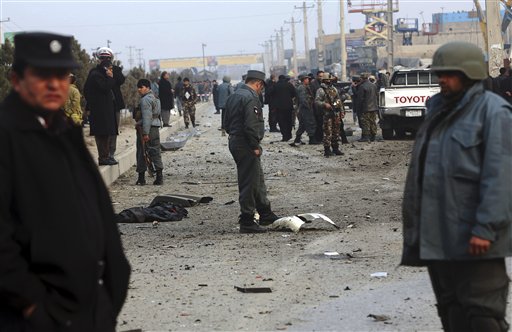
In this Monday, Jan. 5, 2015 photo, Afghan security forces inspect the site of a suicide attack in Kabul, Afghanistan. Analysts and officials said the number of Islamic State supporters in the country and Pakistan remains small and that the group faces resistance from militants with strong tribal links. AP
KABUL, Afghanistan— The top recruiter for the Islamic State group’s affiliate in Afghanistan was killed by a drone strike Monday along with at least four other militants, local officials said, marking the first such attack on the extremist group in a volatile country where it has a small but growing following.
The deputy governor of the southern Helmand province identified the recruiter as Abdul Rauf, saying he and four comrades were killed when a drone-fired missile struck their car. Afghanistan’s intelligence service put the death toll at six and said Afghan forces fired the missile.
The attack would appear to deal a blow to the Islamic State group’s efforts to develop a local affiliate to challenge the long-dominant Taliban.
Last month, Afghan tribal leaders and Western intelligence analysts told The Associated Press that Abdul Rauf was the top Islamic State recruiter in Helmand. Two Afghan officials also said Rauf was a former inmate held by the US at Guantanamo Bay in Cuba. U.S. officials said they had no immediate comment about the strike.
Afghan officials described Rauf as a former Taliban commander who had defected to the Islamic State group, saying that he had started raising the group’s black flags in Helmand towns and villages, taking down the Taliban’s rival white flags.
Saifullah Sanginwal, a tribal leader in the Helmand town of Sangin, said about 20 people had been killed in recent fighting between Islamic State group and Taliban factions.
The Islamic State group controls a third of both Syria and Iraq, where it has declared a self-styled caliphate governed by a harsh interpretation of Islamic law and demanded the allegiance of the world’s Muslims. The Taliban, by contrast, are focused on Afghanistan and Pakistan, and some Taliban leaders have responded to peace overtures in the past.
Analysts and officials say the number of Islamic State group supporters in Afghanistan and Pakistan remains small and the group faces resistance from more established militants with strong tribal links. However, the rise of even a small Islamic State group affiliate could further destabilize the region and complicate American and Nato efforts to end the 13-year Afghan war.
RELATED STORIES
Solon calls for intel task force amid ISIS threat